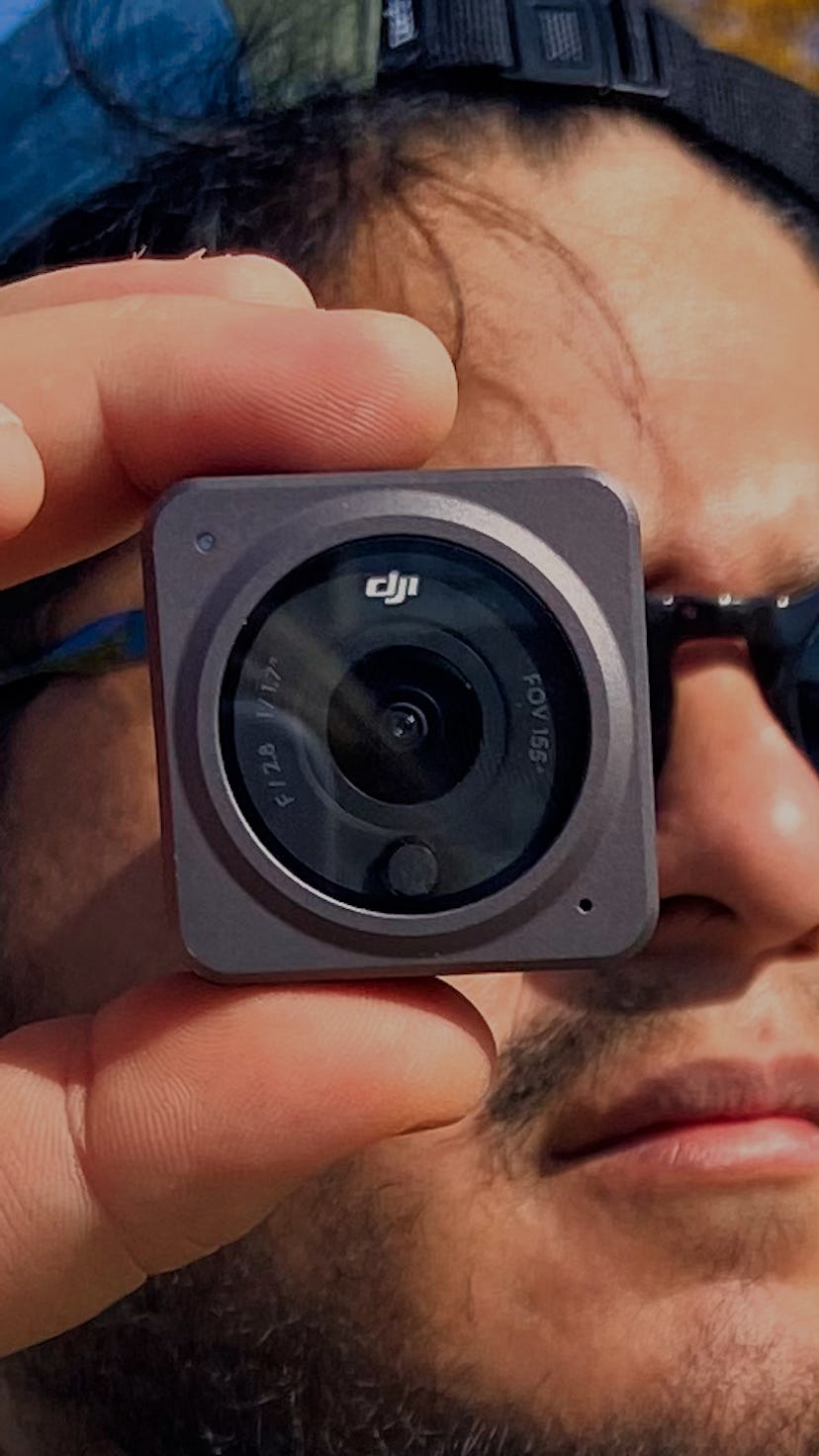The Osmo Action 2 is actually made up of two modules: the top camera module with OLED touchscreen and the choice between the front-facing OLED touchscreen module (Dual-Screen) or the power module (Power Combo). Both secondary modules extend the core module’s battery life by over 50 percent while adding a microSD slot.
Dual-Screen
Modules connect with a magnetic clamp system, and they can be detached just as quickly. When two modules are connected, the bottom one keeps the top one charged up. And if you have the front touchscreen module, you can take advantage of the camera for vlogging, selfies, or other talking-head content.
Single cam
Using two modules gives you more storage and longer capture time. But the camera module works standalone since it has a battery and internal storage. The 32GB of internal storage (22GB usable) isn’t a lot for longer shoots, but it’s enough to shoot a few clips or images. Battery life on the camera module is just over an hour, and that can be extended to just over 2.5 hours with the touchscreen module; 3 hours with the power module.
Not for stills
Let’s get the photography mode out of the way because it’s not good. The 12-megapixel resolution isn’t enough for large images, and zooming in makes everything look blurred and streaked like impressionist art. If you need to capture stills, stick with your phone. I’m not surprised — the Action 2 is for capturing 4K video, timelapses, and slo-mo videos. And it does these so well that the bad photo mode gets a pass.
The Action 2 captures video at 1080p with framerates from 24 to 240 fps. For 2.7K or 4K, framerates run from 24 to 120 fps in 16:9 (60 fps if you use 4:3). I mostly shot videos in both 1080p and 4K at 30 fps to not burn through the storage. While longboarding around a park trail, 60 fps worked out well. For more action-y, jerky movements, a higher framerate is the better choice.
With a max framerate of 240 fps, the Action 2 is a slo-mo beast. For 1080p video, you can slow down footage by eight times. 4K footage can be slowed down by only four times. I loved using slo-mo for everything from shooting reed grass waving in the wind to leaves falling to the ground.
Timelapse and hyperlapse modes pretty cool. You can change the frequency of the shots taken for timelapse, while in hyperlapse you can adjust the speed up to 30 times faster. The hyperlapse mode especially looks good thanks to the stabilization. The Action 2 also has a QuickClip mode for recording either 10, 15, or 30-second clips for social media. In case you just want short clips.
Crystal clear
Videos look great at 1080p — it also helps keep file sizes low. Higher resolutions do get you increased sharpness and more vibrant colors. Overall, the auto exposure and auto white balance do a great job — footage doesn’t look too warm or cool. The colors are a bit on the vivid side. For example, the blue in the sky pops with so much intensity it looks like there’s a polarizing filter. Yellows and greens are quite vibrant, too.
In the box
DJI provided me with the Dual-Screen Combo, which comes with the magnetic lanyard. It’s a kooky accessory that you have to wear under your shirt — the camera magnetically attaches over your shirt. You will definitely look like a dork wearing this, as I did, but it’s handy for shooting hyperlapses. Worth noting: The lanyard limits you to only one module, so use it sparingly.
There are a ton of accessories, but only one that’s a must-have: the remote control extension rod (available mid-November). It’s a handle, tripod, selfie stick with telescoping rod, and has buttons for recording and changing modes. The coolest part: the controller detaches so you can remote control the camera. The wireless controller alone makes this accessory worth it.
The compact design and all-metal housing has a downside: it overheats. While shooting video at a large, cool warehouse space for an art show, the camera overheated and shut down mid-video. Weirdly, it didn’t overheat when I shot an outdoor timelpase on a 70-degree day. DJI says it’s aware of overheating and recommends lowering the resolution — not exactly an ideal fix IMO. Another issue: on a windy day, the microphones pick up a ton of wind noise. DJI’s releasing a mic accessory later this year, but that doesn’t absolve the poor wind noise reduction.
A must-have pocket camera
The $519 price for the Dual-Screen Combo is a bit much, especially if you’re getting the remote control extension rod, which you definitely should. Steep cost aside, DJI’s Action 2 has a ton going for it: small, modular, solid stabilization, 4K/120, plenty of shooting modes, useful accessories. The list goes on. The Action 2 also can be used as a webcam with no extra software. Except for the overheating and weak still photos, the Action 2 rocks. Is it better than a GoPro Hero 10 Black? That depends on if you want something tried and true or modular.
